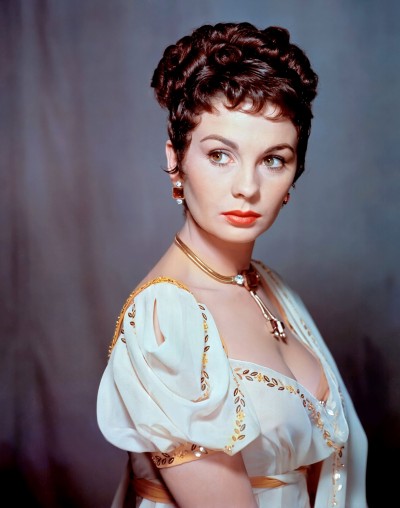Jean Simmons (Jean Merilyn Simmons)

Simmons was born in Lower Holloway, London, to Charles Simmons, a gymnast, and his wife, Winifred (née Loveland) Simmons. Jean was the youngest of four children with siblings Edna, Harold and Lorna. She began acting at the age of 14. During the Second World War, the Simmons family was evacuated to Winscombe, Somerset. Her father, a physical education teacher (who had represented Great Britain in the 1912 Summer Olympics), taught briefly at Sidcot School, and sometime during this period Simmons followed her elder sister on to the village stage and sang songs such as “Daddy Wouldn’t Buy Me a Bow Wow”. Returning to London and just enrolled at the Aida Foster School of Dance, she was spotted by the director Val Guest, who cast her in the Margaret Lockwood vehicle Give Us the Moon. Small roles in several other films followed including the high profile Caesar and Cleopatra, produced by Gabriel Pascal. Pascal saw potential in Simmons and in 1945 he signed her to a seven-year contract. Prior to moving to Hollywood, she played the young Estella in David Lean’s version of Great Expectations (1946) and Ophelia in Laurence Olivier’s Hamlet (1948), for which she received her first Oscar nomination. She played an Indian girl in the Powell-Pressburger film Black Narcissus (1947).
Playing Ophelia to Olivier’s Hamlet made her a star while still in her teens, although she was already well known for her work in other British films, including her first starring role in the film adaptation of Uncle Silas, and Black Narcissus (both 1947). Olivier offered her the chance to work and study at the Bristol Old Vic, advising her to play anything they threw at her to get experience; she was under contract to the Rank Organisation who vetoed the idea. In 1949 Simmons starred with Stewart Granger in Adam and Evelyne. In 1950 she was voted the fourth most popular star in Britain. In 1951 Rank sold her contract to Howard Hughes, who then owned the RKO Pictures. In 1950 she married Stewart Granger, with whom she appeared in several films, and the transition to an American career began. She made four films for Hughes, including Angel Face, directed by Otto Preminger. According to David Thomson “if she had made only one film – Angel Face – she might now be spoken of with the awe given to Louise Brooks.” A court case freed her from the contract with Hughes in 1952.
In 1953 she starred alongside Spencer Tracy in The Actress, a film that was one of her personal favourites. Among the many films she appeared in during this period were The Robe (1953), Young Bess (1953), Désirée (1954), The Egyptian (1954), Guys and Dolls (1955), The Big Country (1958), Elmer Gantry (1960), (directed by her second husband, Richard Brooks), Spartacus (1960), All the Way Home (1963) and The Happy Ending (1969), for which she received her second Oscar nomination. In the opinion of film critic Philip French, Home Before Dark (1958) saw her give “perhaps her finest performance as a housewife driven into a breakdown in Mervyn LeRoy’s psychodrama”. By the 1970s Simmons turned her focus to stage and television acting. She toured the United States in Stephen Sondheim’s A Little Night Music, then took the show to London, and thus originated the role of Desirée Armfeldt in the West End. Performing in the show for three years, she said she never tired of Sondheim’s music; “No matter how tired or off you felt, the music would just pick you up.”
She portrayed Fiona “Fee” Cleary, the Cleary family matriarch, in the 1983 mini-series, The Thorn Birds; she won an Emmy Award for her role. In 1985-86 she appeared in North & South, again playing the role of the family matriarch as Clarissa Main. In 1988 she starred in The Dawning with Anthony Hopkins and Hugh Grant, and in 1989 she appeared in a remake of Great Expectations, in which she played the role of Miss Havisham, Estella’s adoptive mother. She made a late career appearance in the Star Trek: The Next Generation episode “The Drumhead” as a retired Starfleet admiral and hardened legal investigator who conducts a witch-hunt. In 1991 she appeared in the short-lived revival of the 1960s daytime series Dark Shadows, in roles originally played by Joan Bennett. From 1994 until 1998 Simmons narrated the A&E documentary television series, Mysteries of the Bible. In 2004 Simmons voiced the lead-role of Sophie in the English dub of Howl’s Moving Castle.
Jean Simmons was married and divorced twice. She married Stewart Granger in Tucson, Arizona, on 20 December 1950. In 1956 she and Granger became U.S. citizens; they divorced in 1960. On 1 November 1960, she married director Richard Brooks; they divorced in 1977. Although both men were significantly older than Simmons, she denied she was looking for a father figure. Her father had died when she was just 16 but she said: “They were really nothing like my father at all. My father was a gentle, softly-spoken man. My husbands were much noisier and much more opinionated … it’s really nothing to do with age … it’s to do with what’s there – the twinkle and sense of humour.” She had two daughters, Tracy Granger and Kate Brooks, one by each marriage – their names bearing witness to Simmons’ friendship with Spencer Tracy and Katharine Hepburn. Simmons moved to the East Coast in the late 1970s, briefly owning a home in New Milford, Connecticut. Later she returned to California, settling in Santa Monica, where she lived until her death. She died from lung cancer at her home on 22 January 2010, nine days before her 81st birthday, surrounded by her family.
Born
- January, 31, 1929
- United Kingdom
- Lower Holloway, London, England
Died
- January, 22, 2010
- USA
- Santa Monica, California
Cause of Death
- lung cancer
Other
- Cremated




